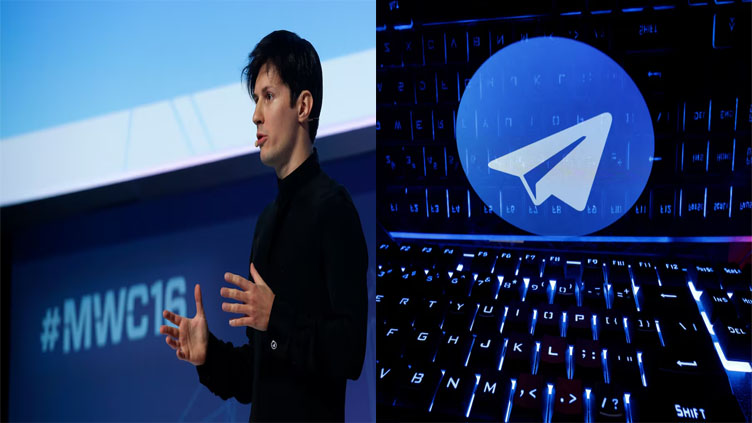Telegram CEO Durov faces preliminary charges in France of allowing crime on messaging app

Technology
France “is committed” to freedom of expression but “freedoms are upheld within a legal framework
PARIS (AP) - French authorities handed preliminary charges to Telegram CEO Pavel Durov on Wednesday for allowing alleged criminal activity on his messaging app and barred him from leaving France pending further investigation.
Both free-speech advocates and authoritarian governments have spoken in Durov’s defense since his weekend arrest. The case has also called attention to the challenges of policing illegal activity online, and to the Russia-born Durov’s own unusual biography and multiple passports.
Durov was detained Saturday at Le Bourget airport outside Paris as part of a sweeping investigation opened earlier this year, and released earlier Wednesday after four days of questioning.
Investigative judges filed preliminary charges Wednesday night and ordered him to pay 5 million euros bail and to report to a police station twice a week, according to a statement from the Paris prosecutor’s office.
Allegations against Durov, who is also a French citizen, include that his platform is being used for child sexual abuse material and drug trafficking, and that Telegram refused to share information or documents with investigators when required by law.
The first preliminary charge against him was for ‘’complicity in managing an online platform to allow illicit transactions by an organized group,’' a crime that can lead to sentences of up to 10 years in prison and 500,000 euro fine, the prosecutor’s office said.
Preliminary charges under French law mean magistrates have strong reason to believe a crime was committed but allow more time for further investigation.
David-Olivier Kaminski, a lawyer for Durov, was quoted by French media as saying “it’s totally absurd to think that the person in charge of a social network could be implicated in criminal acts that don’t concern him, directly or indirectly.”
Prosecutors said Durov is, “at this stage, the only person implicated in this case.” They did not exclude the possibility that other people are being investigated, but declined to comment on other possible arrest warrants.
Any other arrest warrant would be revealed only if the target of such a warrant is detained and informed of their rights, prosecutors said in a statement to the AP.
French authorities opened a preliminary investigation in February in response to ’’the near total absence of a response by Telegram to judicial requests″ for data for pursuing suspects, notably those accused of crimes against children, the prosecutor’s office said.
Durov’s arrest in France has caused outrage in Russia, with some government officials calling it politically motivated and proof of the West’s double standard on freedom of speech.
The outcry has raised eyebrows among Kremlin critics because in 2018, Russian authorities themselves tried to block the Telegram app but failed, withdrawing the ban in 2020.
In Iran, where Telegram is widely used despite being officially banned after years of protests challenging the country’s Shiite theocracy, Durov’s arrest in France prompted comments from the Islamic Republic’s supreme leader.
Ayatollah Ali Khamenei weighed in with veiled praise for France for being “strict” against those who “violate your governance” of the internet.
French President Emmanuel Macron said Monday that Durov’s arrest wasn’t a political move but part of an independent investigation. Macron posted on X that his country “is deeply committed” to freedom of expression but “freedoms are upheld within a legal framework, both on social media and in real life, to protect citizens and respect their fundamental rights.”
In a statement posted on its platform after Durov’s arrest, Telegram said it abides by EU laws, and its moderation is “within industry standards and constantly improving.”
“Almost a billion users globally use Telegram as means of communication and as a source of vital information. We’re awaiting a prompt resolution of this situation,’' it said.
In addition to Russia and France, Durov is also a citizen of the United Arab Emirates and the Caribbean island nation of St. Kitts and Nevis.
The UAE Foreign Ministry said Tuesday that it was “closely following the case” and had asked France to provide Durov “with all the necessary consular services in an urgent manner.”
Kremlin spokesman Dmitry Peskov said he hoped that Durov “has all the necessary opportunities for his legal defense” and added that Moscow stands “ready to provide all necessary assistance and support” to the Telegram CEO as a Russian citizen.
“But the situation is complicated by the fact that he is also a citizen of France,” Peskov said.
Telegram was founded by Durov and his brother after he himself faced pressure from Russian authorities. In 2013, he sold his stake in VKontakte, a popular Russian social networking site which he launched in 2006.
The company came under pressure during the Russian government’s crackdown following mass pro-democracy protests that rocked Moscow at the end of 2011 and 2012.
Durov had said authorities demanded that the site take down online communities of Russian opposition activists, and later that it hand over personal data of users who took part in the 2013-2014 popular uprising in Ukraine, which eventually ousted a pro-Kremlin president.
Durov said in a recent interview that he had turned down these demands and left the country.
The demonstrations prompted Russian authorities to clamp down on the digital space, and Telegram and its pro-privacy stance offered a convenient way for Russians to communicate and share news.
Telegram also continues to be a popular source of news in Ukraine, where both media outlets and officials use it to share information on the war, and deliver missile and air raid alerts.
Western governments have often criticized Telegram for a lack of content moderation.


